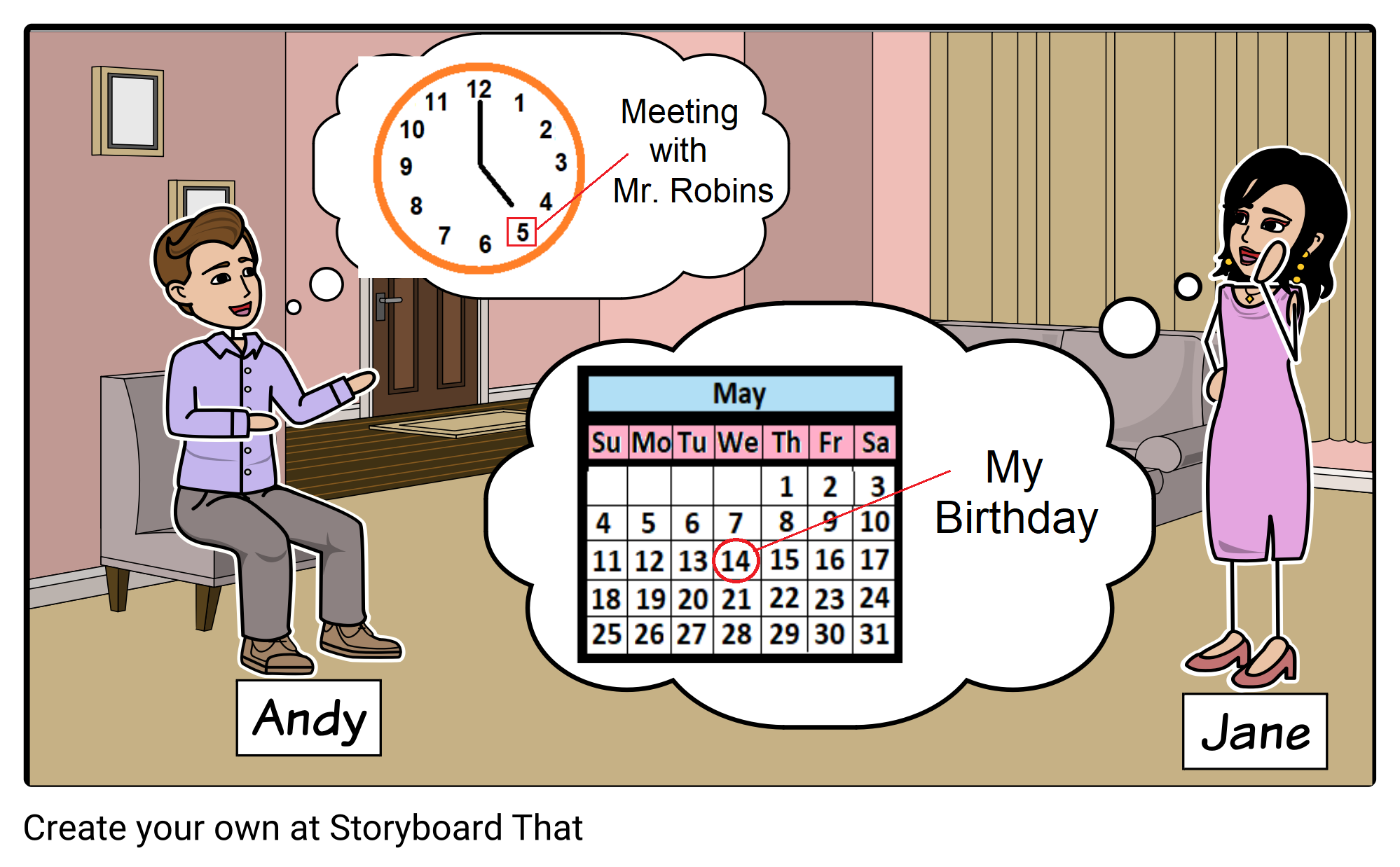LESSON GOAL
Let’s check our lesson goal.
In this material, you will learn how to use prepositions of time in different situations.
In this material, you will learn how to use prepositions of time in different situations.
この教材では、時を表す前置詞を使って、様々な状況について話す練習をします。
PART A_1
Let’s read the dialogue. I will play Ron and you will play Emma. Then, we’ll switch roles.
以下の会話文を読みましょう。最初に講師がRon、あなたがEmmaの部分を読みます。終わったら交代しましょう。
PART A_2

Hi, Emma. It is nice to see you again. By the way, I am inviting you to come to my birthday party on February 6.
|
Let’s see. What day is it? |

It is on Saturday. Are you free on that day?
|
I am free on Saturday. What time is the start of your party? I need to tell my parents so that they would know as well. |

The party starts at five in the afternoon at my house. Don’t worry, my mom will message your parents a day before my birthday party.
|
Okay, thank you. See you at your birthday party, Ron! |
PART A_3
Please answer the questions I’ll ask you about the dialogue.
講師が会話文について質問するので答えてみましょう。
PART A_4
| 1. | When is Ron’s birthday party? |
| Answer: | |
| 2. | What time is Ron’s birthday party? |
| Answer: | |
| 3. | What day of the week does Ron’s birthday fall under? |
| Answer: | |
| 4. | What will Ron’s mom do a day before his birthday? |
| Answer: |
PART B_1
Study the picture for 1 minute. Answer the following questions in complete sentences.
1分間イラストを見てください。その後、次の質問に答えてみましょう。
PART B_2

| 1. | What time is Andy’s meeting with Mr. Robins? |
| Answer: | |
| 2. | When is Jane’s birthday? |
| Answer: | |
| 3. | What month is Jane’s birthday? |
| Answer: |
PART C_1
Let’s talk. Please answer my questions. You may ask questions, too.
会話練習をしましょう。講師が質問しますので答えてみましょう。また、講師に質問してみましょう。
PART C_2
| 1. | At what time do you usually leave for and get home from work/school? |
| Answer: | |
| 2. | Have you ever been late? |
| Answer: | |
| 3. | Do you plan your schedule ahead of time? |
| Answer: | |
| 4. | Have you ever missed an important event? What is it about? |
| Answer: | |
| 5. | What is your favorite event? When is it? |
| Answer: |
REVIEW AND FEEDBACK
Now, let us review the things that you learned in this lesson.
ではこのレッスンで学んだことを振り返りましょう。
(Please give a short feedback on how your student did on your class.)
| Grammar 文法 |
Pronunciation 発音 | Vocabulary 単語 |
Comprehension 理解 |
|
|---|---|---|---|---|
 GOOD GOOD |
文法の誤りはほとんどなく、完全な文章で話すことができる | ほとんどの単語をはっきりと正しく発音することができる | 習った表現を適切に使うことができる | 文章を理解し、質問に正しく答えることができる |
 FAIR |
文法の誤りはあるが、完全な文章で話すことができる | 発音の練習が必要な言葉がいくつかある | たまにミスはあるが、習った表現を適切に使うことができる | 文章を完全に理解するのは難しく、質問に正しく答えられないときもある |
 POOR |
文章で話すのは難しく、単語だけで話すことができる | 発音の練習が必要である | 習った単語と表現を少しだけ使うことができる | 文章を理解するのは難しく、質問に答えるのは難しい |
レッスン教材に関するアンケートのお願い
レッスン教材の改善・拡充を図ることを目的とし、アンケートを実施しております。
以下のURLからアンケートにお答えいただき、 ご意見・ご要望をお聞かせください。
アンケートはこちら